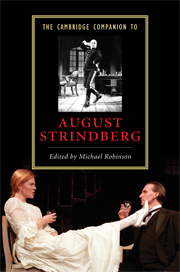13 - Strindberg and modern drama: some lines of influence
from Part III: - Performance and legacy
Published online by Cambridge University Press: 28 May 2010
Summary
Strindberg's legacy is apparent in many aspects of the drama and theatre of the twentieth century. In the years following his death the lineage was quite clear, and the majority of the expressionists were acutely conscious of the impact of his work on them. The following generation, including Eugene O'Neill, also traced important aspects of their artistic pedigree to Strindberg's oeuvre, but the immediate impact was somewhat fainter, and after the Second World War, his direct influence had faded still further. By then, however, criticism was in the process of establishing Strindberg's significant place on the map of the modern theatre.
Two such critical studies are Peter Szondi's groundbreaking work Theorie des modernen Dramas (1956) and Martin Esslin's no less important study, The Theatre of the Absurd (1961). Szondi clearly identified some of the key features that have laid the basis for our understanding of Strindberg's international impact on European drama and theatre, contextualizing his contribution both from a theoretical and a historical perspective, while Esslin made some interesting claims for the Strindberg canon and its importance for a major development of twentieth-century drama and theatre. Both books present a comprehensive overview of the development of modern drama, and in both of them, Strindberg occupies a central position.
- Type
- Chapter
- Information
- The Cambridge Companion to August Strindberg , pp. 164 - 175Publisher: Cambridge University PressPrint publication year: 2009



